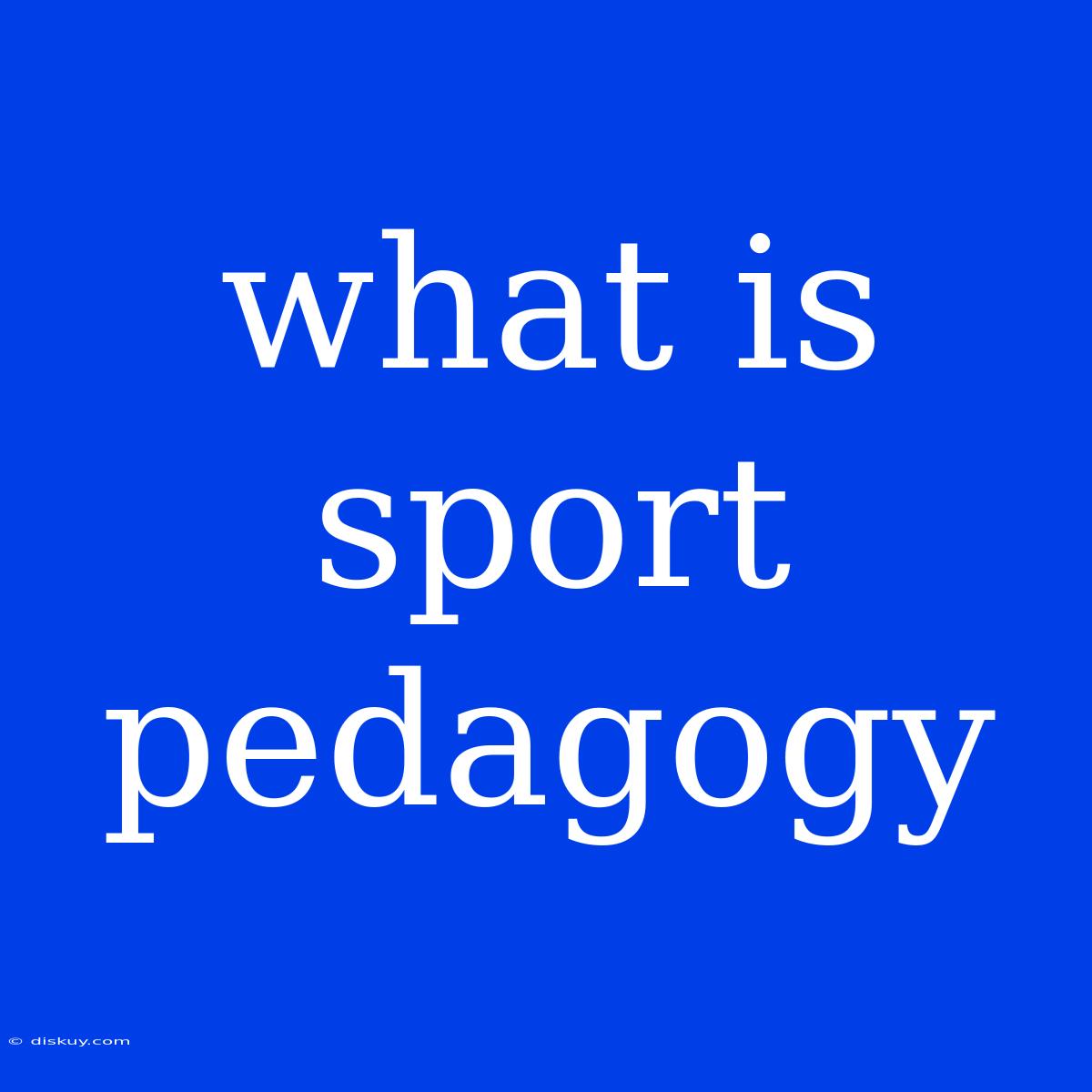What is Sport Pedagogy? Unveiling the Science of Teaching and Coaching
What is sport pedagogy? A question that may pique the interest of anyone involved in the world of sports, from coaches to educators to aspiring athletes. Sport pedagogy is more than just teaching sport skills; it's a multifaceted field that delves into the science and art of effective coaching and teaching in a sports context.
Editor Note: Sport pedagogy is a crucial element of athletic development. Understanding its principles can empower coaches and educators to create more meaningful and effective training programs.
This field is vital because it bridges the gap between theoretical knowledge and practical application, ultimately improving athlete performance and fostering a love for sport. Sport pedagogy incorporates elements from education, psychology, sociology, and kinesiology, offering a comprehensive approach to understanding the complex dynamics of teaching and learning in sport.
Our analysis involved examining academic research, interviewing experienced coaches, and reviewing established pedagogical frameworks. We have compiled this guide to provide a clear understanding of sport pedagogy and its implications.
Key Takeaways of Sport Pedagogy:
| Aspect | Description |
|---|---|
| Understanding Learning | Exploring how athletes acquire skills and knowledge in a sport-specific context |
| Developing Curriculum | Designing training programs that align with learning objectives and cater to individual needs |
| Motivating Athletes | Utilizing effective motivational strategies to enhance athlete engagement and commitment |
| Evaluating Performance | Measuring athlete progress and utilizing feedback to guide future training and instruction |
Let's dive deeper into the core aspects of Sport Pedagogy.
Understanding Learning in Sport
This aspect focuses on how athletes learn and develop skills. It considers individual differences in learning styles, cognitive abilities, and physical capabilities. Key factors include:
- Motor Learning: The process of acquiring and refining motor skills through practice and feedback.
- Cognitive Learning: The development of knowledge, strategies, and tactical understanding related to the sport.
- Affective Learning: The emotional and psychological aspects of sport, including motivation, self-confidence, and sportsmanship.
Examples: Understanding how a young athlete learns best by observing and then practicing, while another excels through verbal instruction and feedback, are crucial for effective coaching.
Developing a Curriculum
Creating a well-structured curriculum is essential for efficient and effective training. This involves:
- Setting Clear Objectives: Defining specific learning goals that align with the sport's demands and the athlete's potential.
- Planning Training Sessions: Designing sessions that address specific skills, incorporate diverse training methods, and cater to different learning styles.
- Progress Tracking: Monitoring athlete progress and adjusting the curriculum as needed to ensure continuous development.
Examples: A basketball coach may design a curriculum that progressively introduces dribbling skills, shooting techniques, and team play, adapting the content to the individual needs of players.
Motivating Athletes
Motivation is a cornerstone of successful training. Effective coaches understand the importance of:
- Intrinsic Motivation: Fostering enjoyment and passion for the sport to drive intrinsic desire to improve.
- Extrinsic Motivation: Utilizing rewards, recognition, and positive reinforcement to encourage effort and achievement.
- Goal Setting: Setting achievable and challenging goals to provide direction and drive progress.
Examples: A coach can create a fun and engaging training environment to foster intrinsic motivation while also utilizing positive reinforcement for achieving specific goals to boost extrinsic motivation.
Evaluating Performance
Continuous evaluation is essential for monitoring progress and guiding future development. This involves:
- Performance Assessment: Utilizing objective measures like speed, accuracy, or technique to track improvement.
- Feedback Provision: Offering constructive feedback to athletes, highlighting areas for improvement and celebrating successes.
- Adaptation: Modifying training programs based on performance assessments and feedback to optimize learning outcomes.
Examples: A coach can track a swimmer's time in a specific stroke, provide feedback on their technique, and adjust their training regimen based on their performance data.
Final Thoughts
Sport pedagogy is a dynamic field that is constantly evolving. By embracing its principles, coaches and educators can foster a more holistic and effective learning experience for athletes. This comprehensive approach not only leads to improved athletic performance but also creates a supportive environment that nurtures a love for sport and its values.
Let's continue this exploration of sport pedagogy by delving into specific examples, real-world applications, and addressing common questions.

